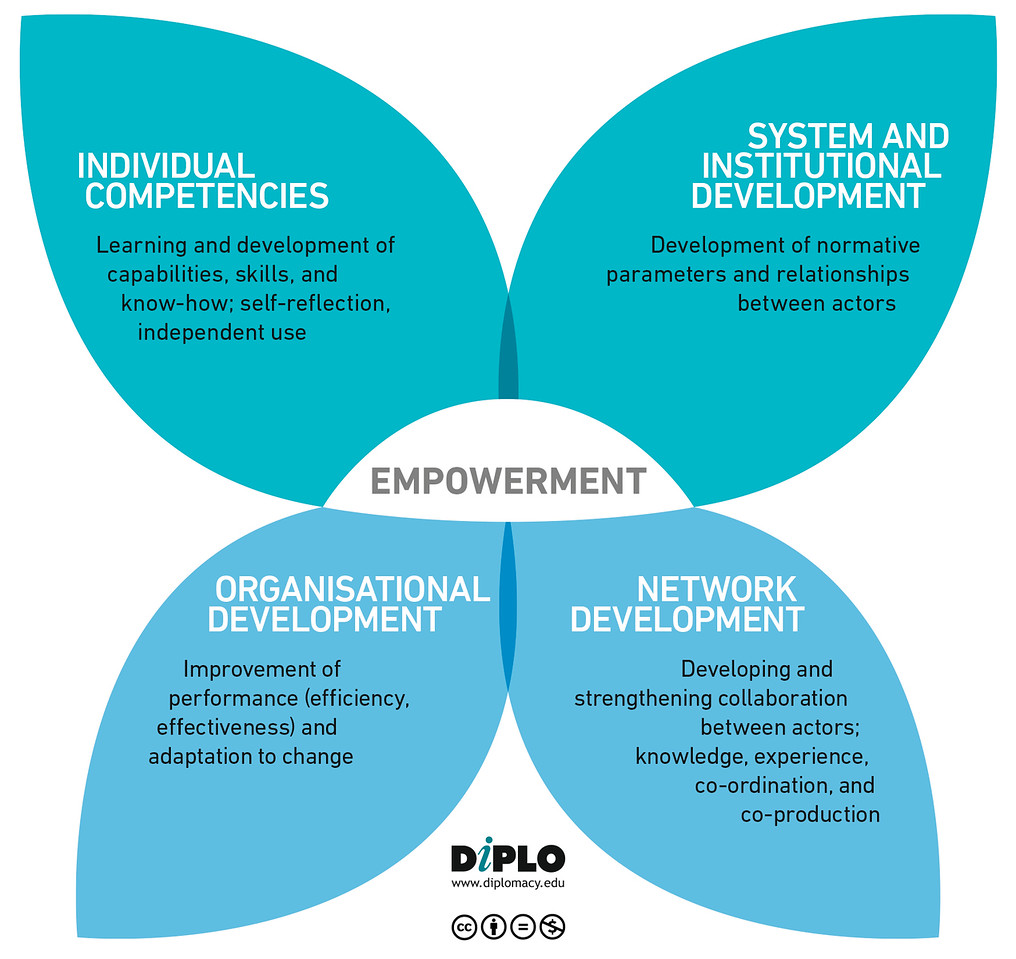Capacity development
If you really want to be good at something, you need to understand the issues at hand thoroughly. You need to be able to see the context, connect the dots, and apply your knowledge in practice. That is the idea behind capacity development – enabling individuals to grasp the subject in question in its full complexity. This is vitally important in the world of digital policy, in which the pace of development (of both solutions and issues) is unceasing. Raising capacities in digital policy helps various stakeholders better navigate through developments related to ICTs and the associated policy implications.
Capacity development is much more than training Capacity development is often defined as the improvement of knowledge, skills, and institutions to make effective use of resources and opportunities. Widespread on the agendas of international development agencies, capacity development programmes range from institutional and societal to the individual level and include a variety of strategies, from fundraising to targeted training. Capacity development for Internet-related matters comprises both the strengthening of institutional capacities (in particular for technical deployment, policymaking, and implementation) and the development of individual competences (skills and abilities pertaining to the information society, including computer literacy, privacy safeguards, etc.). The effectiveness and legitimacy of Internet governance depends on the capacity of nations, organisations, and individuals to meaningfully participate in policy processes. Sufficient capacity in digital policy issues results in more informed policy decisions. In the outcome documents of the World Summit on Information Society (WSIS) (2003/2005), capacity development is underscored as a priority for developing countries. Likewise, the outcome document of the high-level meeting of the UN General Assembly (UNGA) on the overall review of the implementation of the outcomes of WSIS calls for further investments into capacity development. More recently, the importance of capacity development has been raised in the report of the UN High-level Panel on Digital Cooperation. Capacity development in the area of ICTs has also featured highly on the agenda of the UNGA. At the 74th session of the UNGA, ICT capacity building was addressed mainly by national delegates from developing countries who stressed the importance of international support and partnerships, investment in human capital, and adequate training.
Internet governance capacity building
Many organisations, including the International Telecommunication Union (ITU), DiploFoundation, and the Geneva Internet Platform (GIP), the Association for Progressive Communications (APC), the Internet Society (ISOC), and the Internet Corporation for Assigned Names and Numbers (ICANN) have dedicated capacity development programmes. Various regional summer schools on Internet governance also contribute to strengthening capacity, in particular for developing countries. Many of the available programmes focus on telecommunications infrastructure, technical standards, cybersecurity, ICT regulation, freedom of expression, e-commerce, labour law, access to ICTs, and overcoming the digital divide. However, the shift towards a more mature phase of Internet governance and digital policy would require a stronger focus on organisational development by ensuring sustained participation in policy processes. This includes developing the organisational capacities of governments, civil society, businesses, and academia. Organisational and system-level capacity development are becoming particularly relevant in dealing with issues such as cybersecurity. Research on capacity development in general and past experience in Internet governance highlights the following:
- While the Internet is a global facility, Internet policy is often very local. It is shaped by local cultural and social specificities (e.g. cultural sensitivity for content, relevance of privacy protection). Thus, capacity development should follow local dynamics, taking into consideration local political, social, cultural, and other specific conditions in developing and implementing capacity development programmes and activities.
- The urgency for capacity development could be addressed by providing just-in-time learning as a part of policy processes.
- The growing need for capacity in the digital policy field has to be addressed at a more systemic level, by including Internet governance and related topics in the curriculum of academic post-graduate studies.
- Genuine and sustainable empowerment can be achieved through holistic capacity development on the individual, organisational, system, and network levels, as visualised in the capacity development butterfly below.

